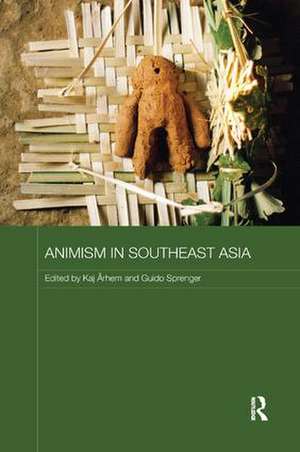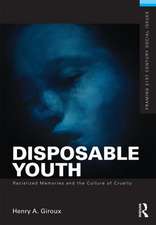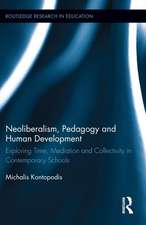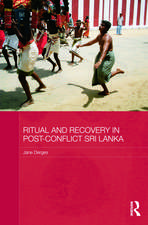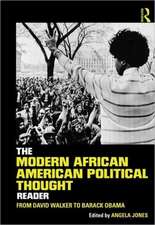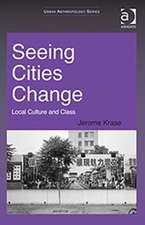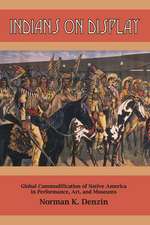Animism in Southeast Asia: Routledge Contemporary Southeast Asia Series
Editat de Kaj Arhem, Guido Sprengeren Limba Engleză Paperback – 22 noi 2017
Based on original fieldwork, this book presents a number of case studies of animism from insular and peninsular Southeast Asia and offers a comprehensive overview of the phenomenon – its diversity and underlying commonalities and its resilience in the face of powerful forces of change. Critically engaging with the current standard notion of animism, based on hunter-gatherer and horticulturalist societies in other regions, it examines the roles of life forces, souls and spirits in local cosmologies and indigenous religion. It proposes an expansion of the concept to societies featuring mixed farming, sacrifice and hierarchy and explores the question of how non-human agents are created through acts of attention and communication, touching upon the relationship between animist ontologies, world religion, and the state.
Shedding new light on Southeast Asian religious ethnographic research, the book is a significant contribution to anthropological theory and the revitalization of the concept of animism in the humanities and social sciences.
| Toate formatele și edițiile | Preț | Express |
|---|---|---|
| Paperback (1) | 449.41 lei 6-8 săpt. | |
| Taylor & Francis – 22 noi 2017 | 449.41 lei 6-8 săpt. | |
| Hardback (1) | 1170.60 lei 6-8 săpt. | |
| Taylor & Francis – 23 noi 2015 | 1170.60 lei 6-8 săpt. |
Din seria Routledge Contemporary Southeast Asia Series
-
 Preț: 310.84 lei
Preț: 310.84 lei -
 Preț: 310.65 lei
Preț: 310.65 lei -
 Preț: 281.72 lei
Preț: 281.72 lei -
 Preț: 310.95 lei
Preț: 310.95 lei -
 Preț: 317.63 lei
Preț: 317.63 lei -
 Preț: 310.96 lei
Preț: 310.96 lei -
 Preț: 320.51 lei
Preț: 320.51 lei -
 Preț: 151.94 lei
Preț: 151.94 lei -
 Preț: 340.62 lei
Preț: 340.62 lei -
 Preț: 318.65 lei
Preț: 318.65 lei - 18%
 Preț: 1058.79 lei
Preț: 1058.79 lei - 18%
 Preț: 1055.21 lei
Preț: 1055.21 lei -
 Preț: 412.57 lei
Preț: 412.57 lei - 41%
 Preț: 238.48 lei
Preț: 238.48 lei - 18%
 Preț: 1054.58 lei
Preț: 1054.58 lei - 18%
 Preț: 1111.51 lei
Preț: 1111.51 lei - 18%
 Preț: 1062.98 lei
Preț: 1062.98 lei - 18%
 Preț: 1166.49 lei
Preț: 1166.49 lei - 18%
 Preț: 1056.28 lei
Preț: 1056.28 lei -
 Preț: 410.28 lei
Preț: 410.28 lei - 18%
 Preț: 1060.25 lei
Preț: 1060.25 lei - 18%
 Preț: 1060.52 lei
Preț: 1060.52 lei - 18%
 Preț: 1057.75 lei
Preț: 1057.75 lei - 18%
 Preț: 708.67 lei
Preț: 708.67 lei - 26%
 Preț: 821.10 lei
Preț: 821.10 lei - 18%
 Preț: 1060.87 lei
Preț: 1060.87 lei - 18%
 Preț: 1057.05 lei
Preț: 1057.05 lei - 25%
 Preț: 825.43 lei
Preț: 825.43 lei - 15%
 Preț: 707.79 lei
Preț: 707.79 lei - 18%
 Preț: 1058.86 lei
Preț: 1058.86 lei - 18%
 Preț: 1280.80 lei
Preț: 1280.80 lei - 25%
 Preț: 824.17 lei
Preț: 824.17 lei - 18%
 Preț: 1000.61 lei
Preț: 1000.61 lei - 28%
 Preț: 820.56 lei
Preț: 820.56 lei - 18%
 Preț: 1064.01 lei
Preț: 1064.01 lei - 18%
 Preț: 736.24 lei
Preț: 736.24 lei - 18%
 Preț: 1164.92 lei
Preț: 1164.92 lei - 18%
 Preț: 1217.95 lei
Preț: 1217.95 lei - 26%
 Preț: 848.03 lei
Preț: 848.03 lei - 18%
 Preț: 1053.47 lei
Preț: 1053.47 lei - 18%
 Preț: 1057.75 lei
Preț: 1057.75 lei - 18%
 Preț: 1053.92 lei
Preț: 1053.92 lei - 18%
 Preț: 1106.02 lei
Preț: 1106.02 lei - 18%
 Preț: 1057.05 lei
Preț: 1057.05 lei - 18%
 Preț: 1060.52 lei
Preț: 1060.52 lei -
 Preț: 428.63 lei
Preț: 428.63 lei -
 Preț: 385.25 lei
Preț: 385.25 lei - 18%
 Preț: 1057.75 lei
Preț: 1057.75 lei
Preț: 449.41 lei
Nou
Puncte Express: 674
Preț estimativ în valută:
85.100€ • 90.43$ • 71.06£
85.100€ • 90.43$ • 71.06£
Carte tipărită la comandă
Livrare economică 16-30 aprilie
Preluare comenzi: 021 569.72.76
Specificații
ISBN-13: 9780815392156
ISBN-10: 081539215X
Pagini: 340
Ilustrații: 6 Line drawings, black and white; 1 Tables, black and white; 6 Illustrations, black and white
Dimensiuni: 156 x 234 x 26 mm
Greutate: 0.45 kg
Ediția:1
Editura: Taylor & Francis
Colecția Routledge
Seria Routledge Contemporary Southeast Asia Series
Locul publicării:Oxford, United Kingdom
ISBN-10: 081539215X
Pagini: 340
Ilustrații: 6 Line drawings, black and white; 1 Tables, black and white; 6 Illustrations, black and white
Dimensiuni: 156 x 234 x 26 mm
Greutate: 0.45 kg
Ediția:1
Editura: Taylor & Francis
Colecția Routledge
Seria Routledge Contemporary Southeast Asia Series
Locul publicării:Oxford, United Kingdom
Public țintă
PostgraduateCuprins
Part One: Introductory 1. Southeast Asian Animism in Context 2. Dimensions of Animism in Southeast Asia Part Two: Case Studies – Mainland and The Philippines 3. Seeing and Knowing: Metamorphosis and the Fragility of Species in Chewong Animistic Ideology 4. Graded Personhood: Human and Non-human Actors in the Southeast Asian Uplands 5. Animism and the Hunter’s Dilemma: Hunting, Sacrifice and Asymmetric Exchange Among the Katu of Vietnam 6. Wrestling With Spirits, Escaping the State: Animist Ecology and Settlement Policy in the Annamite Cordillera 7. Actualizing Spirits: Ifugao Animism as Onto-praxis Part Three: Case Studies – Insular Southeast Asia 8. Relatedness and Alterity in Bentian Human-spirit Relations 9. The Dynamics of the Cosmic Conversation: Beliefs bout Spirits among the Kelabit and Penan of the Upper Baram River, Sarawak 10. Animism and Anxiety: Religious Conversion among the Kelabit of Sarawak 11. Boundaries of Humanity: Non-human Others and Animist Ontology in Eastern Indonesia 12. Gods and Spirits in the Wetu Telu Religion of Lombok 13. Impaling Spirit: Three Categories of Ontological Domain in Eastern Indonesia Part Four: Concluding 14. Southeast-Asian Animism: A Dialogue with Amerindian Perspectivism 15. End Comment: To Conclude in the Spirit of Rebirth, or, a Note on Animic Anthropo-ontogenesis
Notă biografică
Kaj Århem is Emeritus Professor in Social Anthropology at the University of Gothenburg, Sweden. His previously published books include: Makuna: Portrait of an Amazonian People (1998); Ethnographic Puzzles (2000) and The Katu Village (2010).
Guido Sprenger is Professor at the Institute of Anthropology, Heidelberg University, Germany. He has previously published on ritual, exchange, human-environment relations, kinship and social morphology, cultural identity, and sexuality.
Guido Sprenger is Professor at the Institute of Anthropology, Heidelberg University, Germany. He has previously published on ritual, exchange, human-environment relations, kinship and social morphology, cultural identity, and sexuality.
Recenzii
Selected for the Outstanding Academic Title (OAT) Award 2017 by CHOICE magazine.
"These papers are a tremendous addition to comparative studies, Southeast Asian studies theory and methods, and ethnographic work. Defining and revitalizing animism, the editors bring together original fieldwork from 11 anthropologists. They define animism as the "ontologies or worldviews which assign agency and personhood to human and non-human beings alike." The German and Swedish editors keep the traditional theories in play while adding significantly to the body of methodological knowledge. The fieldwork is exceptional and wide-ranging; each essay serves as a springboard to further examination. This rare volume, both strong in content and groundbreaking in theory and methods, is a publication of the work on a panel organized at the sixth Conference of the European Association of Southeast Asian Studies in Gothenburg, Sweden, in August 2010. An exciting addition to the already powerful Routledge Contemporary Southeast Asia series. Summing Up: Essential." -- L. L. Lam-Easton, California State University, Northridge in CHOICE.
"... this book includes a number of ethnographically detailed and analytically well-articulated essays which should prove valuable to anyone interested in comparative cosmology and forms of symbolic or spiritual knowledge, not just in Southeast Asia but more generally."
Gregory Forth, University of Alberta, Journal of the Royal Anthropological Institute
"These papers are a tremendous addition to comparative studies, Southeast Asian studies theory and methods, and ethnographic work. Defining and revitalizing animism, the editors bring together original fieldwork from 11 anthropologists. They define animism as the "ontologies or worldviews which assign agency and personhood to human and non-human beings alike." The German and Swedish editors keep the traditional theories in play while adding significantly to the body of methodological knowledge. The fieldwork is exceptional and wide-ranging; each essay serves as a springboard to further examination. This rare volume, both strong in content and groundbreaking in theory and methods, is a publication of the work on a panel organized at the sixth Conference of the European Association of Southeast Asian Studies in Gothenburg, Sweden, in August 2010. An exciting addition to the already powerful Routledge Contemporary Southeast Asia series. Summing Up: Essential." -- L. L. Lam-Easton, California State University, Northridge in CHOICE.
"... this book includes a number of ethnographically detailed and analytically well-articulated essays which should prove valuable to anyone interested in comparative cosmology and forms of symbolic or spiritual knowledge, not just in Southeast Asia but more generally."
Gregory Forth, University of Alberta, Journal of the Royal Anthropological Institute
Descriere
Based on original fieldwork, this book presents a number of case studies of animism from insular and peninsular Southeast Asia and offers a comprehensive overview of the phenomenon – its diversity and underlying commonalities and its resilience in the face of powerful forces of change. Shedding new light on Southeast Asian religious ethnographic research, the book is a significant contribution to anthropological theory and the revitalization of the concept of animism in the humanities and social sciences.
